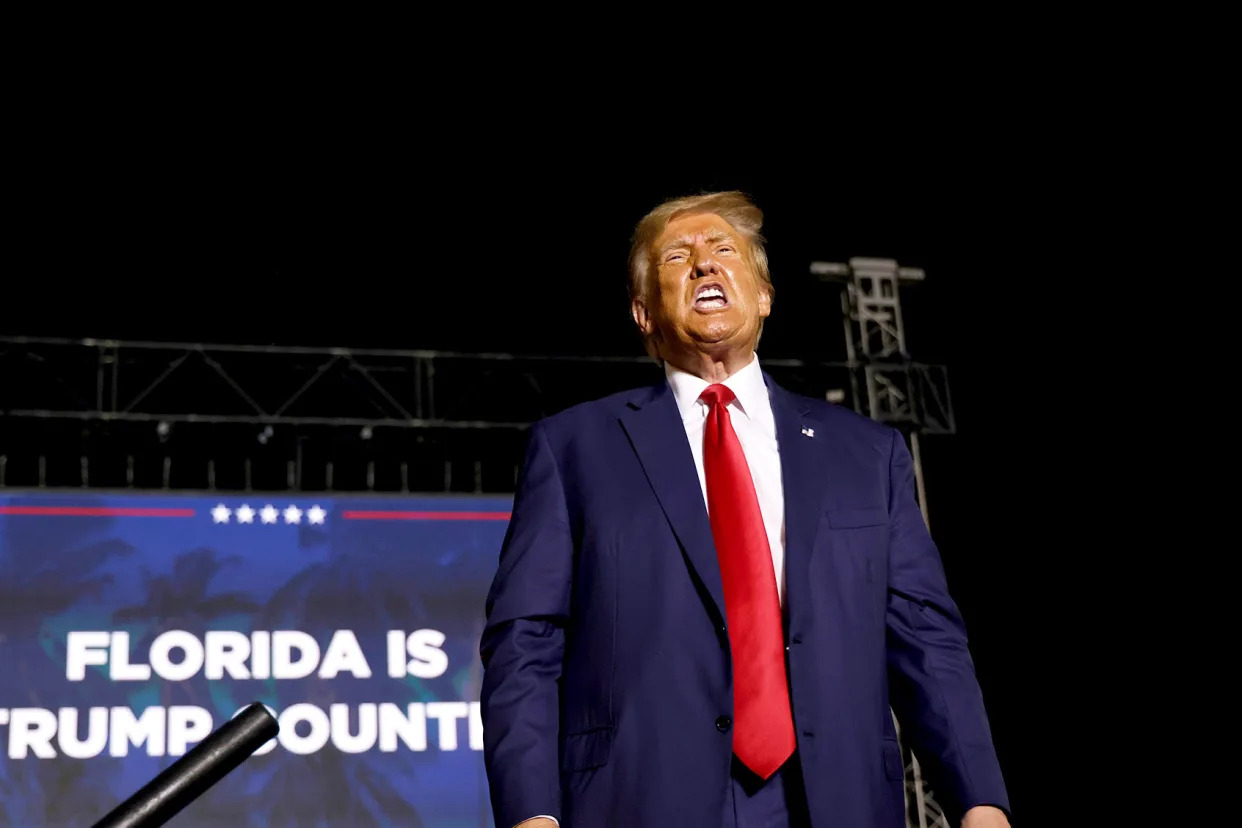Donald Trump’s hate sermons are becoming even more intense and combustible. As he comes ever closer to openly quoting Adolf Hitler and the other 20th-century fascists, his behavior is clearly intentional and strategic.
Trump publicly admires and praises tyrants and demagogues and views them as role models. If he returns to power in 2025, he intends to create an American Fourth Reich. Consider Trump's speeches, interviews and social media posts over the last few weeks.
At a rally in Hialeah, Florida, last Wednesday, Trump painted a picture of a hellish (predominantly white) America overrun by serial killers and other human monsters from foreign (and predominantly nonwhite) countries, insisting that only he could save (white) America from the death and contamination caused by Democrats and “the left.”
“Anybody ever hear of Hannibal Lecter?” Trump asked the crowd. “He was a nice fellow. But that’s what’s coming into our country right now.”
The Atlantic’s John Hendrickson continues from there:
The leader of the Republican Party — and quite likely the 2024 GOP nominee — was on an extended rant about mental institutions, prisons, and, to use his phrase, “empty insane asylums.” Speaking to thousands of die-hard supporters at a rally in South Florida, Trump lamented that, under President Joe Biden, the United States has become “the dumping ground of the world.” That he had casually praised one of the most infamous psychopathic serial killers in cinema history was but an aside, brushed over and forgotten.
This was a dystopian, at times gothic speech. It droned on for nearly 90 minutes. Trump attacked the “liars and leeches” who have been “sucking the life and blood” out of the country. Those unnamed people were similar to, yet different from, the “rotten, corrupt, and tyrannical establishment” of Washington, D.C. — a place Trump famously despises, and to which he nonetheless longs to return.
Over the past seven or so years, I have watched many of Trump’s speeches. This was one of the most frightening and most disturbing I have seen. It was fascinating in much the same way as witnessing the aftermath of a horrible car accident or watching a horror movie.
Although many among the news media, pundit class and other professional politics-watchers avoid saying this, Trump’s dark charisma can be highly compelling. I'm convinced they feel its allure as well, even if they publicly deny it.
On Friday, in an interview with Univision, Trump threatened to use the Department of Justice to put his political enemies in prison: “They have done something that allows the next party … if I happen to be president and I see somebody who’s doing well and beating me very badly, I say, ‘Go down and indict them.’ They’d be out of business. They’d be out of the election.” Trump also defended his regime’s cruel family separation policy (and by implication concentration camp system) that targeted millions of brown and Black migrants and refugees.
These white supremacist plans are part of a larger project to revoke birthright citizenship, invoke the Alien Enemies Act to imprison or deport (or worse) the Trump regime’s perceived enemies, and using the law more generally as a weapon to crush dissent and resistance.
Last weekend, on Veterans Day, Trump escalated his Nazi-style threats by declaring that his political enemies to be "vermin" or human poison to be purged from the system. That came at a MAGA rally in New Hampshire and also in a post on his Truth Social platform:
In honor of our great Veterans on Veteran’s Day, we pledge to you that we will root out the Communists, Marxists, Fascists, and Radical Left Thugs that live like vermin within the confines of our Country, lie, steal, and cheat on Elections, and will do anything possible, whether legally or illegally, to destroy America, and the American Dream. The threat from outside forces is far less sinister, dangerous, and grave, than the threat from within. Despite the hatred and anger of the Radical Left Lunatics who want to destroy our Country, we will MAKE AMERICA GREAT AGAIN!
At a fundraising event in San Francisco last Tuesday, President Biden spoke out against Trump’s antisemitism and white supremacy: “In just the last few days, Trump has said, if he returns office, he’s gonna go after all those who oppose him and wipe out what he called ... the vermin in America — a specific phrase with a specific meaning…. It echoes language you heard in Nazi Germany in the '30s.”
In a post on Truth Social that went largely ignored by the mainstream media, Trump continued to summon Nazi imagery by threatening to imprison “Radical Left Zealots" in a “mental institution”:
Deranged Jack Smith, Andrew Weissmann, Lisa Monaco, the “team of losers and misfits” from CREW, and all the rest of the Radical Left Zealots and Thugs who have been working illegally for years to “take me down,” will end up, because of their suffering from a horrible disease, TRUMP DERANGEMENT SYNDROME (TDS!), in a Mental Institution by the time my next term as President is successfully completed. MAKE AMERICA GREAT AGAIN!
Declaring that the enemies of the regime and the Great Leader are mentally ill and then imprisoning them for "treatment" is a common practice in authoritarian states.
Predictably, the mainstream news media and responsible political class responded with performative shock and surprise at Trump’s week-long channeling of Hitler and Nazism. In fact, Trump’s hateful behavior and language are no surprise.
For at least the last seven years (and for decades before that), Trump has shown himself to be a casual antisemite. He reportedly once slept with a copy of Hitler’s speeches in a cabinet next to his bed. It is no coincidence that professed Nazis, white supremacists and other hate-mongers are among Trump’s strongest supporters, or that he refuses to publicly disavow or condemn them.
It appears that the American news media and political class, and by implication the mass public, have already forgotten that since at least September Trump has publicly spread conspiracy theories about being “stabbed in the back,” suggesting that the country is being “poisoned” by immigrants and that “good Jews” should support him while “bad Jews” will be punished for their “betrayals.”
But the mainstream media is bored with Trump's rhetoric and has now largely moved on. That irresponsible choice further normalizes Trump’s evil and the larger neofascist assault on the country’s democracy and civil society.
It is nearly incredible that the presumed nominee of one of the country’s two institutional political parties is explicitly channeling Hitler and the Nazis. That should be dominating the news. Trump's Fourth Reich aspirations constitute a national emergency. But America is an unhealthy society where all this will likely be normalized as just "culture war" tactics or political "polarization."
Want a daily wrap-up of all the news and commentary Salon has to offer? Subscribe to our morning newsletter, Crash Course.
If Donald Trump's American neofascist movement did not have tens of millions of followers, it would not pose an existential threat to democracy. History is full of examples of “good people” who become capable of doing horrible things to others once they are given permission and encouraged by fascist leaders, fake populists and demagogues.
In his book “Promise Me You’ll Shoot Yourself,” which examines mass suicides by Germans at the end of World War II, historian Florian Huber writes:
After leaving the German Reich in 1933 to run the Paris offices of the Daily Express, British newspaper correspondent Sefton Delmer returned in 1936. He found people transformed. Three years had been enough to put them under the Führer’s spell. “They were adoring his firm ruthless rule. They were in raptures at being told what to think, whom to hate, when to cheer.” … He knew, and knew how to galvanize, their feelings, yearnings and prejudices—how to transform depression into exhilaration. As a man of the people, he spoke their language. He was the faith healer they had been waiting for.” …
Silence in the arena, as his voice swelled. He spoke of victory over the past, of the present, and the future, work and happiness — and every member of the audience seemed to feel as if he we addressing them personally. ... [H]e transformed their vague but urgent feelings into something more tangible. People’s longings and resentments were laid out before them, on public view. Their most secret thoughts were no longer to be ashamed of; they belonged to everyone in the hall.
Trump has a similar power over his MAGA followers. Here is Hendrickson’s description of the scene at Trump’s Florida rally last week:
No other candidate has legions of fans who will bake in the Florida sun for hours before gates open. No one else can draw enough people to even hold a rally this size, let alone spawn a traveling rally-adjacent road show, with a pop-up midway of vendors hawking T-shirts and buttons and ball caps and doormats and Christmas ornaments. Voters don’t fan themselves with cardboard cutouts of Chris Christie’s head.
Multiple merchandise vendors told me that the shirts featuring Trump’s mug shot have become their best sellers. Some other tees bore slogans: ultra maga, ultra maga and proud, cancel me, trump rallies matter, 4 time indictment champ, super duper ultra maga, f*ck biden. “Thank you and have a MAGA day!” one vendor called out with glee. … In the hours before the night’s headliner, this felt less like a political event and more like a revival.
Trump’s Fourth Reich will not be an exact copy of its German counterpart from nearly a century ago. Instead, Trump’s Fourth Reich (or that of his successors) will be adapted to fit contemporary America’s cultural norms, values and institutions. The final horror is still evolving, but the threat and dangers are very clear. The American people are running out of time.






























